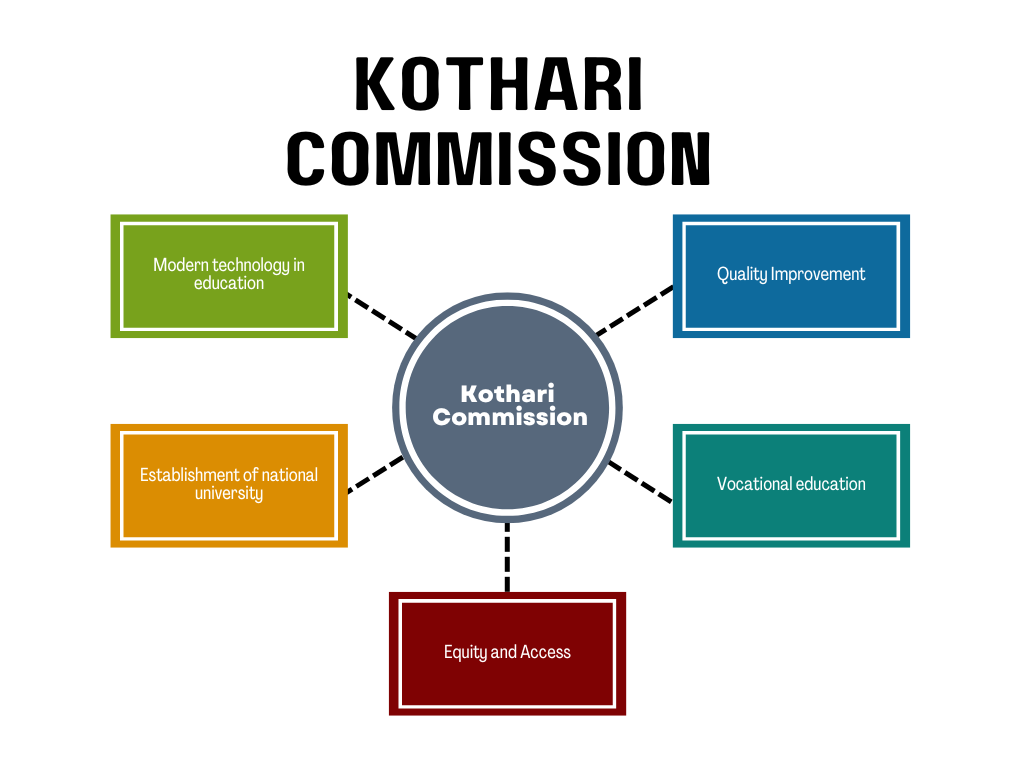The Kothari Commission, also known as the Education Commission of 1964-66, was a high-level committee set up by the Government of India in 1964 to examine all aspects of the education sector in India and to provide recommendations for its improvement. The commission was headed by D. S. Kothari, an eminent educationist, and had several other members, including academicians, policymakers, and administrators.
Main Focus of the Kothari Commission
The main point of the Kothari Commission was to study the issues related to education in India and provide recommendations for its improvement. The commission’s report, submitted in 1966, identified several key challenges facing the education sector in India, such as low levels of literacy, inadequate access to education, poor quality of education, and the lack of relevance of education to the needs of society and the economy.
The Kothari Commission’s report, submitted in 1966, provided a comprehensive analysis of the state of education in India, identified the key challenges, and made recommendations for reforms. The recommendations covered a broad range of issues like
- The expansion of educational opportunities
- The improvement of the quality of education
- The establishment of national universities
- The introduction of vocational education
- The universalization of elementary education
- The use of modern technology in education.
The Kothari Commission’s recommendations have been the basis for many education policies and programs in India since their release, and the commission’s report is considered a seminal document in the history of education in India.
The commission’s recommendations were aimed at creating a more equitable, relevant, and efficient education system that would contribute to the overall development of the country. The Kothari Commission’s report has had a significant influence on the education policies and programs in India since its release, and its recommendations continue to shape the education system in the country today.
The Kothari Commission, also known as the Education Commission of 1964-66, had several features that were distinctive and significant in the context of education in India. Some of the main features of the Kothari Commission are:
- Comprehensive approach: The Kothari Commission had a comprehensive approach to studying the education system in India. It examined all aspects of education, from elementary education to higher education, and considered the social, economic, and cultural factors that influenced education.
- Holistic vision: The Commission had a holistic vision of education that emphasized the development of the whole person, including the intellectual, social, emotional, and moral dimensions of education.
- Equity and access: The Commission recognized the importance of equity and access in education and recommended measures to ensure that all segments of society had access to quality education.
- Quality improvement: The Commission emphasized the need to improve the quality of education in India and made recommendations for improving teacher training, curriculum development, and educational technology.
- Vocational education: The Commission recognized the importance of vocational education in preparing students for employment and recommended the introduction of vocational education at various levels of education.
- National universities: The Commission recommended the establishment of national universities to promote excellence in higher education and research.
- Elementary education: The Commission emphasized the need to universalize elementary education and recommended measures.
Also Read: Behavioristic Theory of learning
Check the Youtube Channel: Prep with Harshita



4 thoughts on “Kothari Commission”